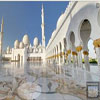
Dreams for a grand mosque in Marseille have been put on hold for more than two decades, after far-right opposition and lack of funding stalled construction plans for the worshipping house needed for more than 250,000 Muslims in France's second-largest city.
"I'd love to go to that Grand Mosque for Friday prayers," Hakim, who owns a café next to the flea market and goes to pray at the mosque next door several times a day,
"Muslims across the city could gather there, at least once a week. So far, though, we've heard a lot of talk, but we have seen nothing."
Hakim's mosque is located in the second floor of a former port warehouse, sandwiched between the seafront highway and a giant flea market.
On Fridays, more than 2,000 people squeeze in, trying to make space wherever they can find it.
The mosque capacity is far from what is needed to serve around 250,000 Muslims living in Marseille.
"Some even pray on the street," says Harun Derbal, the imam. "But at least, we've got a good sound system."
Muslims have planned to build a grand mosque in Marseille's northern Saint-Louis area.
"Here it is," said Abderrahmane Ghoul, the head of the Marseille Mosque association, pointing at a stone covered with graffiti.
The project has been plagued by problems since Marseille's mayor allocated a former slaughterhouse and its surrounding field to the organization in 2006.
After the approval, far-right National Front party filed a lawsuit claiming the cheap rent offered by the city government violated France's law prohibiting state support of religion. The court agreed, raising rent from $350 a month to more than $2000.
Then the National Front attacked the construction permit. Yet, the most pressing problem was the funding support, as the organization was $25 million short.
French Mosque
Being in dire short of funding, the mosque organization was offered support by Algeria who wanted to impose an Algerian imam.
"The day of the foundation stone laying ceremony, we were expecting Algeria to draft a check. Instead, the consul started asking us about the future imam and told us he would have to be Algerian," Ghoul said.
"There was just a single stone, not even a building yet, but they already wanted to push their people in."
Foreign countries have bankrolled most of the mosques built in the country since the 1990s. Saudi Arabia paid for the one in Lyon. Morocco, the one in Saint Etienne.
The mosque there is named after King Mohamed VI and even became property of the Moroccan state.
The Algerian request was rejected by the mosque administration who wanted a French mosque for the French Muslims.
"We don't want another country to run the mosque" he says.
"If we were OK with that, we'd have it up and running already."
Harun Derbal, the imam of the flea market mosque, said the plan for the Grand Mosque should be put on hold.
"If you're naked, don't ask for a ring," Derbal says.
"You have to put on clothes first, and then go for the accessories. What this community needs first are decent places where they can pray.
"Instead of obsessing over a Grand Mosque that doesn't materialize, maybe we should build four or five smaller, cheaper mosques around town and when the day comes our community can afford to build a bigger mosque by our own means, we'll do it then!"
Yet, Ghoul, who's been working on the Grand Mosque project for two decades, says that feels insufficient.
For him, the absence of a centerpiece for Islam in the city breeds more resentment among Muslims, paving the way for underground mosques where self-proclaimed imams spread a radical version of Islam.
"Our independence is costing us a lot of time, but we accept that," he said.
French Muslims complain that they lack enough mosques, forcing them to pray on the street.
They have only 1,500 prayer houses, most of which are housed in small, modest halls, often described as "basement mosques."
In Paris, where the Muslim population is denser than elsewhere in France, there is only one grand mosque, the Great Mosque of Paris, far away from immigrant-heavy neighborhoods.
French Muslims complain of major difficulties to build mosques, including funding and public opposition to mosque construction.
An IFOP poll showed that support for building mosques fell to 20 percent in 2009 from 31 percent in 2000.
source : www.abna.ir













